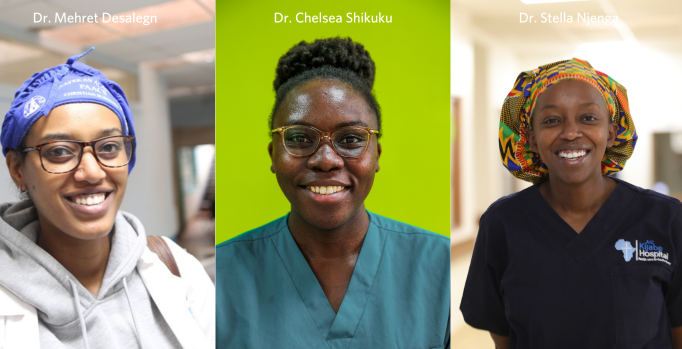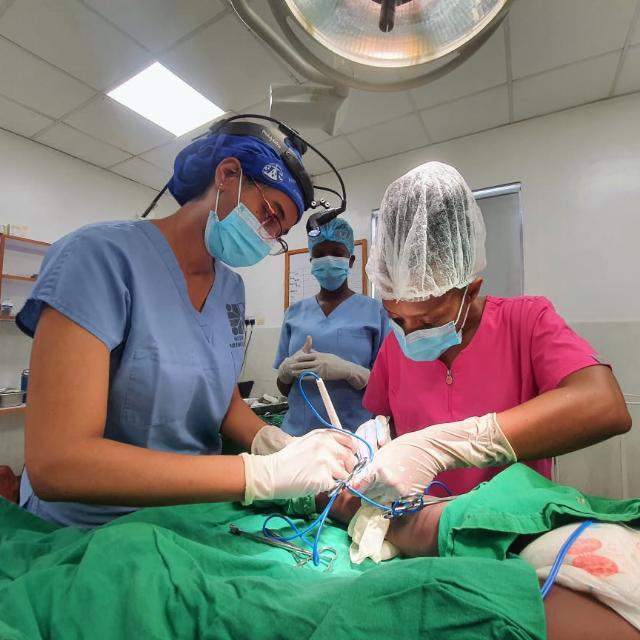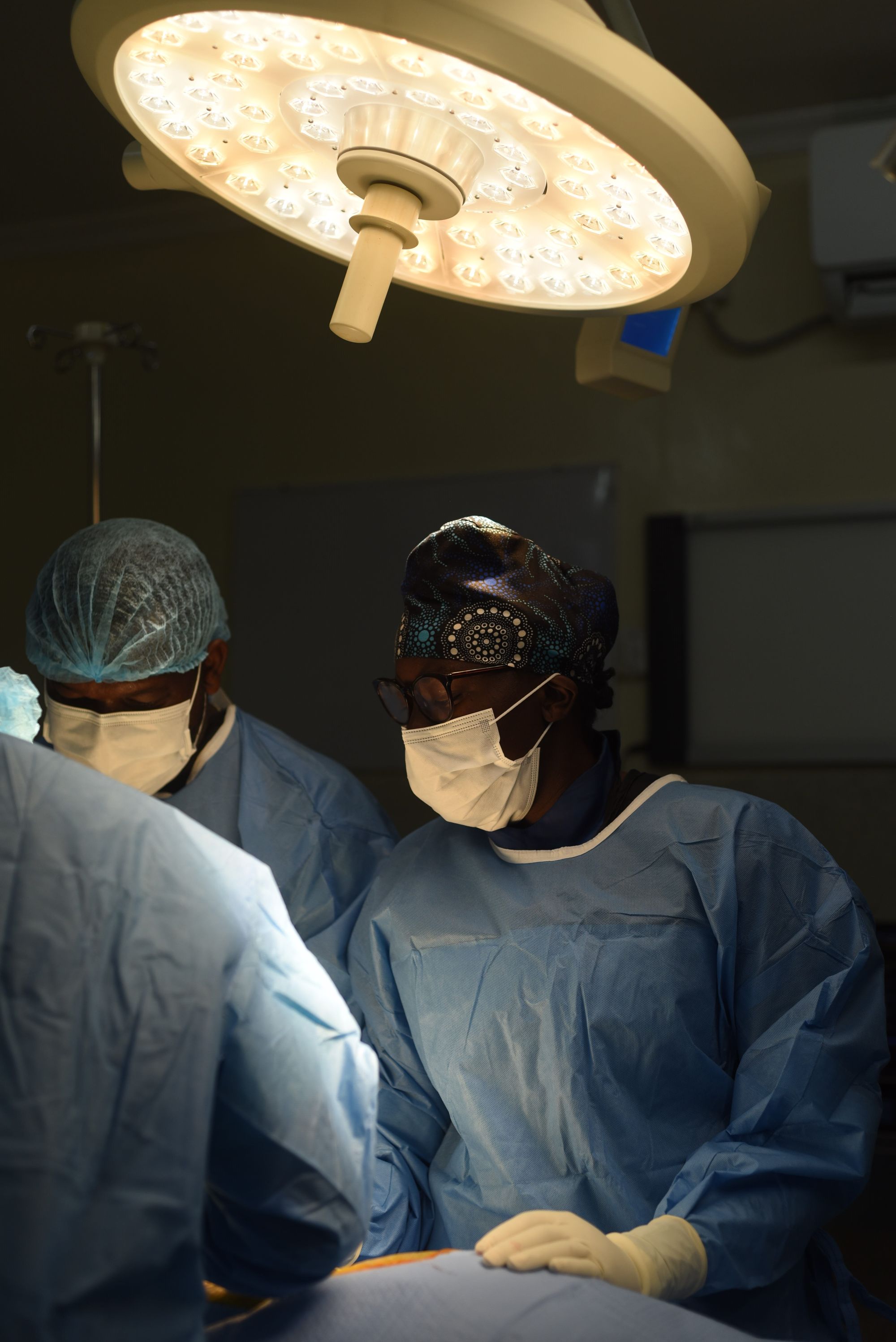As we go about our daily lives, it's easy to take for granted simple things like good health. But for many people around the world, access to quality healthcare is a luxury that they cannot afford. That's where our local medical partners like African Mission Healthcare (AMH) and their network of hospitals across East Africa come in. Every day, these hospitals are providing life-saving treatment to Watsi patients who otherwise would not have access to care. And the heroes on the front lines of these hospitals are the medical teams who dedicate their lives to helping others.
Meet Dr. Mehret, Dr. Chelsea, and Dr. Stella - three remarkable young surgeons working in Kijabe, Kenya. These women are pushing boundaries and paving the way for future generations of health workers. The future looks bright knowing it is in their hands!

Dr. Mehret, a pediatric surgeon at BethanyKids Kijabe Hospital, discovered her love for taking care of children during medical school and found the best combination of the two in pediatric surgery. Join us as we take a closer look at her remarkable journey:
What inspired you to dedicate your career to medicine?
"Growing up I always thought of finding a way to help people in need and I saw being involved in healthcare as one of the best ways to do that. As I went through school, I enjoyed the subjects that dealt with human biology which geared my desire more toward medicine. Fortunately, I trained to be a medical doctor and it is during medical school I discovered that I loved taking care of children and enjoyed my surgical attachments. I discovered the best combination of the two in pediatric surgery. This discovery led me to pursue a career in pediatric surgery."
What do you see as the biggest challenges facing health workers, particularly women, today?
"The biggest challenge is cultural biases that promote men dominating the medical profession. However, this has been significantly improved in the last two decades worldwide but there is still some work to be done to continue training and encouraging more and more women to join and practice medicine. The biggest challenges we face in taking care of patients here in the developing world are limited resources in terms of medical equipment, availability of necessary medicines, and axillary expertise, especially in taking care of pediatric patients. This lack of resources also contributes to the delay of patients in presenting to our care because of a lack of finances and lack of awareness. Once the patient presents to the hospital, we face the challenge of not being able to help the patient or not being able to help them to the best because of the limitation in investigating this patient and taking care of them."
How do you think we can work to better support and empower frontline health workers around the world?
"I believe the best way is to create a functional and growing healthcare system in developing countries. One aspect is finding a sustainable way of training more health professionals that are well-versed in managing patients in resource-limited settings but also have high standards of quality healthcare.
On-job training is also a great way of updating the knowledge and skills of the healthcare provider. This can be achieved through different collaborations with hospitals within the country and abroad.
The other aspect is assisting the healthcare system to build furnished and well-equipped hospitals. In a hospital setting, until there is robust health coverage for the patients, supporting the acute financial needs as we continue to work towards a more sustainable and country-wide health care coverage system. With the available resources, patients will be able to present sooner with the understanding that they will be well taken care of even if they don’t come with money. That way health care providers will take care of them before it is too late and will be able to provide the necessary care and don’t struggle with the psychological burden involved in these settings."

Dr. Chelsea, an Orthopedics Resident at Cure International Hospital in Kenya, was inspired to pursue a career in medicine after volunteering at a children's home that serves children with disabilities. Through this experience, she saw the need for more pediatric orthopedic surgeons who can extend services to children in need all year round.
Dr. Chelsea shared with us that one of the biggest challenges facing health workers, particularly women, is often the patient's perspective of female healthcare workers. She believes that this has been improving in the last few years with more women pursuing medical professions and more so orthopedic surgery.
When we asked "How do you think we can work to better support and empower frontline health workers around the world?", Dr. Chelsea shared:
"Watsi fills in the financial gap for needy patients who would have not been otherwise able to afford care. This has been and continues to be very beneficial."

Dr. Stella's story is a moving one.
As an OB-GYN consultant at AIC Kijabe Hospital, she was inspired to pursue a career in medicine by her own family. She went on to share:
"My first inspiration was my mum who was a midwife when I was younger. We always used to wait for her at the hospital from school so that we could go home together. I really loved the whole hospital experience. I started calling myself Dr. Njenga while in nursery school. My second inspiration was my younger brother who had Duchenne muscular dystrophy. I had promised to discover a cure for him when I became a doctor. He, unfortunately, passed away before I could fulfill my promise."
Dr. Stella believes that the lack of resources is the biggest challenge facing healthcare workers in Kenya today. This leads to patients delaying coming to the hospital, which can worsen their condition and in turn places a deeper psychological burden on healthcare providers. But she shares a solution when we asked how can we work to better support and empower frontline health workers around the world?
By offering training and employment opportunities to young doctors. Offering mentorship opportunities. Realizing that doctors are also humans who bear a heavy physical and emotional burden from interacting with all kinds of patients daily. We at times just need a listening ear to debrief and at times, time off to recalibrate and recover from the pressures of this career. ~ Dr. Stella, OB-GYN Consultant, Kenya
The need to support frontline healthcare workers has never been greater. Burnout, stress, and trauma are all real and pervasive risks for those working in healthcare. According to a report by the World Health Organization (WHO), burnout and stress among healthcare workers have become a global epidemic, with 60% of nurses experiencing burnout. The COVID-19 pandemic only exacerbated this issue, with healthcare workers facing long hours, inadequate resources, and increased exposure to illness.
By supporting Watsi and our local medical partners like AMH all year long, we can help ensure that frontline workers have the resources and support they need to continue their critical work serving their communities.
Let's show our solidarity and support for these brave and tireless workers. Join our Universal Fund community today and help empower healthcare workers to continue fighting on the frontlines.
Together, we can #UnlockMoreForHealth and ensure that our healthcare heroes—including Dr. Mehret, Dr. Chelsea, and Dr. Stella—receive the support they need and deserve.
The Watsi Team
Everyone deserves healthcare.